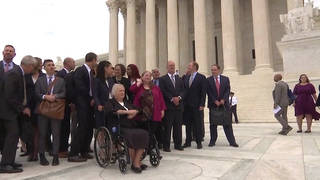
By Amy Goodman with Denis Moynihan
The U.S. Supreme Court announced three historic 5-to-4 decisions this week. In the first, a core component of the Voting Rights Act was gutted, enabling Southern states to enact regressive voting laws that will likely disenfranchise the ever-growing number of voters of color. The second pair of cases threw out the federal Defense of Marriage Act (DOMA), the legal travesty that defined marriage in federal law as only between a man and a woman, and effectively overturned California’s Prop 8, which bans same-sex marriage. For those who struggle for equality and civil rights, these three decisions mark one brutal defeat and two stunning victories.
“What the court did … is stab the Voting Rights Act of 1965 in its very heart,” Georgia Congressman John Lewis said of Tuesday’s decision. “It is a major setback. We may not have people being beaten today. Maybe they’re not being denied the right to participate or to register to vote. They’re not being chased by police dogs or trampled by horses. But in the 11 states of the old Confederacy, and even in some of the states outside of the South, there’s been a systematic, deliberate attempt to take us back to another period.”
Lewis is the 73-year-old dean of the Georgia congressional delegation. As a young man, he led the Student Nonviolent Coordinating Committee (SNCC), and was the youngest speaker to address the March on Washington 50 years ago. He recently recalled a signal moment in that struggle, appearing on the “Democracy Now!” news hour:
“On March 7, 1965, a group of us attempted to march from Selma to Montgomery, Alabama, to dramatize to the nation that people wanted to register to vote. … In Selma, Alabama, in 1965, only 2.1 percent of blacks of voting age were registered to vote. The only place you could attempt to register was to go down to the courthouse. You had to pass a so-called literacy test. And they would tell people over and over again that they didn’t or couldn’t pass the literacy test.”











Media Options